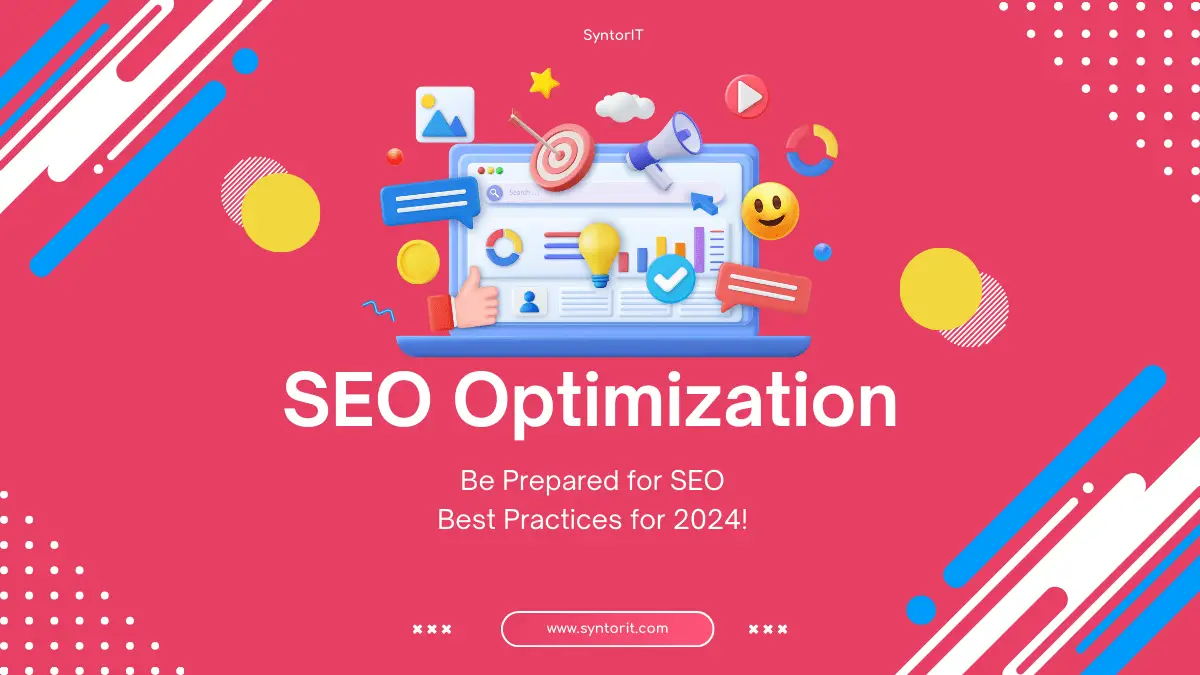In today’s digital landscape, having a website is no longer enough—your site needs to be easily discoverable and optimized for search engines to compete in the crowded online space. That’s where Search Engine Optimization (SEO) plays a vital role. Integrating SEO best practices from the early stages of web development is crucial for achieving long-term success and maintaining a competitive edge.
At Syntorit, we believe that SEO and web development go hand in hand. In this post, we’ll explore the critical role SEO plays in web development and share best practices to follow in 2024.
Introduction to SEO
Search Engine Optimization (SEO) is the process of enhancing a website’s visibility on search engine result pages (SERPs) by improving its structure, content, and other key elements. SEO helps ensure that your website is easily discoverable by search engines like Google, Bing, and Yahoo, ultimately driving more organic (non-paid) traffic to your site.
In a digital-first world, SEO is essential for businesses looking to stand out in a crowded online marketplace. It involves optimizing various aspects of a website—such as keywords, meta descriptions, site speed, mobile-friendliness, and content quality—to align with search engine algorithms. The better optimized a site is, the higher it will rank, making it more likely for users to find and engage with your content.
SEO is not just about driving traffic; it’s about attracting the right audience. Effective SEO strategies improve user experience (UX), enhance credibility, and increase conversions, making it an indispensable tool for online success.

Why SEO Should Be Integrated into Web Development
When SEO is considered during the development phase of a website, it creates a strong foundation for better search engine visibility. Websites that are built with SEO in mind tend to perform better in search engine rankings, drive more traffic, and ultimately result in higher conversion rates.
Here are some key reasons why SEO is crucial to web development:
Improved Search Engine Visibility
Websites designed with SEO principles ensure that search engines like Google can easily crawl, index, and rank your content. When you implement proper on-page SEO elements during development, it helps search engines understand your website’s purpose and content relevance.Enhanced User Experience (UX)
SEO goes beyond keywords—it’s about creating a seamless experience for users. A website that is optimized for SEO is fast, mobile-friendly, and easy to navigate. This not only improves rankings but also leads to higher user satisfaction and lower bounce rates.Long-Term Success
SEO is a long-term investment. By incorporating SEO-friendly structures and elements in web development, your website is set up for sustainable growth. This means fewer reworks and ongoing SEO adjustments down the road.
Best SEO Practices for Web Development in 2024
As we move into 2024, several SEO trends and techniques are shaping how websites should be developed. Here are the best practices to follow:
1. Mobile-First Development
With over 50% of global web traffic coming from mobile devices, having a mobile-friendly website is more important than ever. In fact, Google uses mobile-first indexing, which means it primarily uses the mobile version of your site for ranking and indexing.
Best Practices:
- Ensure your website is fully responsive and provides a seamless experience across devices.
- Use dynamic serving or separate URLs for mobile and desktop versions.
- Optimize images and reduce page load times on mobile.
2. Site Speed Optimization
A fast-loading website is not only vital for user experience but is also a key ranking factor. Search engines prioritize websites that load quickly, especially on mobile.
Best Practices:
- Minimize the use of large images and videos that can slow down page speed.
- Compress files and enable browser caching.
- Utilize Content Delivery Networks (CDNs) to distribute content efficiently.
3. Structured Data (Schema Markup)
Structured data helps search engines understand the content of your website better. By using schema markup, you can enhance how your content is displayed in search results, often resulting in rich snippets that improve click-through rates.
Best Practices:
- Implement schema markup for your website, including product information, reviews, and events.
- Use structured data for articles, FAQs, and blog posts to appear in rich snippets.
4. Optimized URL Structure
A clean, well-organized URL structure helps search engines and users understand the hierarchy and content of your website. URLs should be descriptive and easy to read.
Best Practices:
- Keep URLs short, descriptive, and keyword-rich.
- Avoid special characters and unnecessary parameters in URLs.
- Use hyphens to separate words in URLs (e.g., “best-seo-practices-2024” rather than “bestseopractices2024”).
5. Core Web Vitals
In 2024, Core Web Vitals will continue to be a critical factor for search rankings. These metrics—Largest Contentful Paint (LCP), First Input Delay (FID), and Cumulative Layout Shift (CLS)—measure the overall user experience of your site.
Best Practices:
- Monitor and improve your Core Web Vitals through regular site audits.
- Focus on reducing server response times and optimizing for faster interactivity.
- Minimize layout shifts by properly specifying image dimensions.
6. On-Page Optimization
On-page SEO is still essential in 2024. This involves optimizing the content and elements within your web pages to ensure they’re search-engine friendly.
Best Practices:
- Use keyword-rich headings (H1, H2, H3) that align with your content’s structure.
- Optimize meta tags, title tags, and descriptions to make them engaging and keyword-targeted.
- Ensure internal linking is used strategically to help search engines crawl your website efficiently.

SEO is no longer just an afterthought—it’s an integral part of the web development process. By adhering to these SEO best practices for 2024, you can ensure that your website not only looks great but also ranks high on search engines and provides an excellent user experience.
At Syntorit, we specialize in building SEO-friendly websites that help businesses achieve their digital goals. Whether you need a new website or want to optimize your existing one, our team is here to guide you every step of the way.
Contact us today to learn how we can help your business thrive in the digital age.



